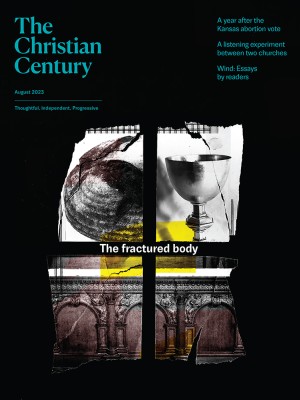August 27, Ordinary 21A (Matthew 16:13–20)
I find it comforting to realize that Jesus recognizes the incompleteness of Peter’s understanding.
I recently celebrated my 59th birthday during an especially debilitating flare-up of multiple sclerosis, my unwelcome companion of three decades. Though I can still take my daily beach walks with my dingo, I now use a cane to propel myself through the sand. And I find myself musing on questions that haven’t plagued me since my late adolescence: Who am I? What is my purpose in life? What do I have to offer the world with my unique set of limitations? Where do I fit in to this world?
It’s an age-old human question, honed to obsession in the 21st century: Who am I? But though it permeates our culture now, we don’t have a monopoly on the question. For proof of the importance of identity, look no further than the genealogy that launches the Gospel of Matthew, where the writer lays out a historical resume to prove Jesus’ identity. Then, as now, questions of identity and belonging are essential.
Read our latest issue or browse back issues.
When Jesus asks his disciples the divinely existential question of who the people and then the disciples think he is, his essential question is also all about identity—Jesus’ identity, Peter’s identity, and ultimately our identity as Christians.
The disciples report that people (anthrōpoi) see Jesus (huios tou anthrōpou or “Son of man/humanity” in Jesus’ question) in the context of figures from the past, but Peter recognizes Jesus as someone who melds the past and the future into the present time: the long-awaited Messiah who was and is to come has indeed arrived. One who, Peter clarifies, is also “the Son of the living God.”
We don’t know if the writer of Matthew was familiar with the letter to the Hebrews and its thundering proclamation that “it is a fearful thing to fall into the hands of the living God” (10:31), but he most certainly was intimately familiar with the Hebrew Bible. In the Hebrew Bible, the phrase “the living God” often carries the sense that this deity is to be feared by those who are not on his side. As Moses asks the people, “For who is there of all flesh that has heard the voice of the living God speaking out of the fire, as we have, and lived?” (Deut. 5:26).
With this theological context, the location of Jesus’ question to his disciples—in a seat of Roman power in the district of Caesarea Philippi, north of Galilee—illuminates Peter’s response. Peter’s mind is not on a New Testament Messiah who will be arrested, tortured, and killed. Instead, he sees Jesus as a political, exclusive Messiah, one who will put an end to the Roman occupation and fully establish the glory of God’s people—the son of the living, all-powerful God.
Even given this clear misunderstanding, and knowing how directly Jesus rebukes Peter at other times, it’s remarkable to read Jesus’ genuine delight at Peter’s response: “Blessed are you, Simon son of Jonah!” he exclaims, marking Peter’s recognition of Jesus as the Messiah as a God-given realization: “For flesh and blood has not revealed this to you but my Father in heaven.” He goes on, in a witty wordplay that English readers largely miss, to proclaim him the future rock of his church.
I find it comforting to realize that Jesus recognizes the incompleteness of Peter’s understanding of Jesus’ identity. He knows Peter must experience repeated disappointment before he truly understands what kind of Messiah Jesus is. Peter’s world will still be turned upside down, but Jesus nevertheless celebrates his first quantum step toward understanding, a step none of the other apostles is willing or able to take.
Peter has a front-row seat to Jesus’ work and words, but he still isn’t privy to a complete unveiling of God’s nature. In some way, this feels like good news for me. Because despite the troves of information I have access to today, I still don’t truly comprehend who God is. Peter’s interaction with Jesus tells me that though I surely will fall short of any declaration about God that will do him justice, God patiently continues to uplift me—as long as I sincerely continue to seek more of the nature of God. This should permeate me—and, just as importantly, the church—with a deep sense of humility.
I read Jesus’ excitement about Peter’s very partial understanding of Jesus’ nature as a confirmation of that journey. In my life as a believer, those identity questions continue to crop up: Who do you say I am? And when I tap out an answer—however incomplete, however tainted by my location or my narrow theological context or my human limitations—I can imagine his delight from his response to Peter: That’s right! You didn’t come up with this on your own. You’re a rock in my living church!





